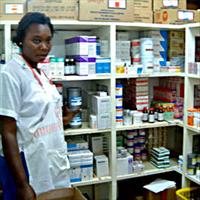BURKINA FASO: Government inaction spurs consumption of counterfeit drugs

One in five pharmaceutical drugs bought in Ouagadougou is counterfeit and sold on the street with no prescription and no expiry date, according to the Ministry of Health.
Despite laws banning the practice, the government has lost control of the industry and the unregulated drug market continues to expand, with damaging health consequences, fear doctors - and cheating the economy of up to US$4.7 million per year, according to the National Committee of Drug Control (CNLD).
Government security forces have seized a record 23.6 tonnes of illicit pharmaceuticals in Ouagadougou over the last three years, according to the CNLD, and in regular raids they capture up to three tonnes in a single hour.
“It is alarming to know that we can find drugs [on the street] that are meant to treat chronic diseases like cardiovascular disease or arthritis”, Alfred Sanwidi, vice-president of the Burkina Faso Pharmacist Order (OPB) said, adding “drugs for cattle are even sold as vitamins”.
Health risks
“At all levels of the health service, we find people who are being harmed because of these drugs - from developing liver problems, to building up resistance to other needed medicines,” Adama Lingany, head of the nephrology department at Yalgado Ouédraogo hospital, told IRIN.
Chronic use of many counterfeit medicines can have dangerous side-effects. For instance, steroidal anti-inflammatory medicine, administered in high doses, can cause gastric haemorrhages, high blood pressure, ulcers, kidney failure, and hepatitis, reported a 2003 study by local pharmacist Hamado Sawadogo.
Eighty-one percent of drug consumers had not visited a doctor and were ignorant of their health status, and 70 percent of them did not know of the potential dangers illicit medicines may bring, Sawadogo’s study revealed.
“They did not know if they were diabetic, had high blood pressure or had an ulcer,” he told IRIN.
Many of the most vulnerable are poor people who cannot afford a full course of drug treatments, and so just buy a few pills instead, according to drug-seller Amadou Dianda. “Some may even buy on credit, and pay later,” he told IRIN.
Market forces
According to OPB’s Sanwidi, even though national regulations stipulate consumers can only buy medicine with a prescription, most people know they can buy whatever they want in a local street market, without one.
Mobile phone technology buoys the market, with sellers using phones to warn each other of impending raids, allowing them to continue operations with relative ease.
Burkina Faso shares borders with six countries, many of them relatively “permeable”, Mahamoudou Compaoré, director of pharmaceutical medicines at the Ministry of Health, told IRIN, which ensures a steady supply.
The problem is also difficult to tackle simply because many of the sellers are children, who are often unaware of the impact of what they are doing, and cannot be arrested, he added.
Government impotence
Christophe Campaoré, coordinator of the CNLD, said the government was impotent in the face of the trade, because it had no capacity to tackle it.
“We need to identify and arrest the importers through special operations that demand a lot of resources and good information, but we are relatively resource-less,” he said, adding that none of the forces used in government “sting” operations had yet received adequate training.
As a result, drug raids are limited to Ouagadougou, while markets in other cities such as Bobo-Dioulasso, 280km to the southwest, go unmonitored.
But local doctor Alfred Sanwidi thinks it is also a lack of will, with border guards lax when it comes to inspections: “The drugs enter by bicycle, truck, and through official border entries, because of the weakness of the border controls.”
For some the key to cracking down on the trade is to get local authorities involved rather than trying to tackle the problem from the capital.
“Officials in all localities, including mayors, should address the illicit drugs through their policies and priorities. Unfortunately few have understood this yet,” Sawadogo told IRIN.
According to the World Health Organization (WHO), 10 percent of world pharmaceuticals are counterfeit, which represents a $32 billion slice of the market. WHO predicts that counterfeit drug sales will reach $75 billion globally by 2010, an increase of over 90 percent from 2005 levels.
See Also
- Critical health care fails to reach most women and children in high mortality countries despite gains in fighting child killer diseases
- ZIMBABWE: Not enough money to feed the hungry
- WHO: noncommunicable diseases, world’s biggest killers
- BURKINA FASO: Food riots shut down main towns
- WHO alarms on health threats
 Back and Next - Back and Next
Back and Next - Back and Next See Also - See Also
See Also - See Also